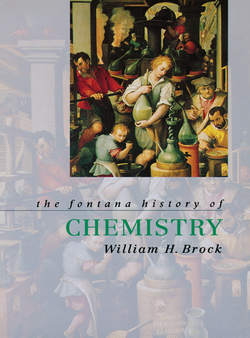Читать книгу The Fontana History of Chemistry - William Brock J. - Страница 24
3 Elements of Chemistry
ОглавлениеDoubtless a vigorous error vigorously pursued has kept the embryos of truth a-breathing: the quest for gold being at the same time a questioning of substances, the body of chemistry is prepared for its soul, and Lavoisier is born.
(GEORGE ELIOT, Middlemarch, 1872)
‘Chemistry is a French science; it was founded by Lavoisier of immortal fame.’ So wrote Adolph Wurtz in the historical ‘Discours préliminaire’ of his Dictionnaire de chimie pure et appliquée (1869). Needless to say, at a time of intense European nationalism and rivalry, in science as much as in politics, such a claim proved instantly controversial. In fact, as early as 1794, Georg Lichtenberg (1742–99) had argued that the anti-phlogistic chemistry was bringing nothing new to Germany. ‘France’, he claimed, ‘is not the country from which we Germans are accustomed to expect lasting scientific principles.’ As far as Lichtenberg was concerned, whatever might be of value in Lavoisier’s new system of chemistry was really of German origin. Thorpe’s riposte to Wurtz seventy years later was that ‘chemistry is an English science, its founder was Cavendish of immortal memory’ – thus invoking an earlier controversy over which European nation’s chemists had first synthesized water. Raoul Jagnaux’s Histoire de chimie (1896) presented the history of chemistry almost entirely as a French affair, with Lavoisier, once again, as its founder. This led twentieth-century German historians to write histories that emphasized that the origins of modern chemistry lay in the chemical contributions of Stahl and, before him, of Paracelsus.
Today we can smile at such nationalistic obsessions and agree that, even though Lavoisier could never have achieved what he did without the prior and contemporary investigations and interpretations of British, Scandinavian and German chemists and pharmacists, there is an essential grain of truth in Wurtz’s statement. For Lavoisier restructured chemistry from fundamental principles, provided it with a new language and fresh goals. To put this another way, a modern chemist, on looking at a chemical treatise published before Lavoisier’s time, would find it largely incomprehensible; but everything written by Lavoisier himself, or composed a few years after his death, would cause a modern reader little difficulty. Lavoisier modernized chemistry, and the benchmark of this was the publication of his Traité élémentaire de chimie in 1789. On the other hand, historians have come to recognize the continuities between Lavoisier’s work and that of his predecessors. Lavoisier’s deliberate decision to break with the past and to put chemistry on a new footing inevitably meant that he was cavalier with history and that he paid scant attention to his predecessors – thus indirectly providing a source of his own mythology as the father of chemistry.
